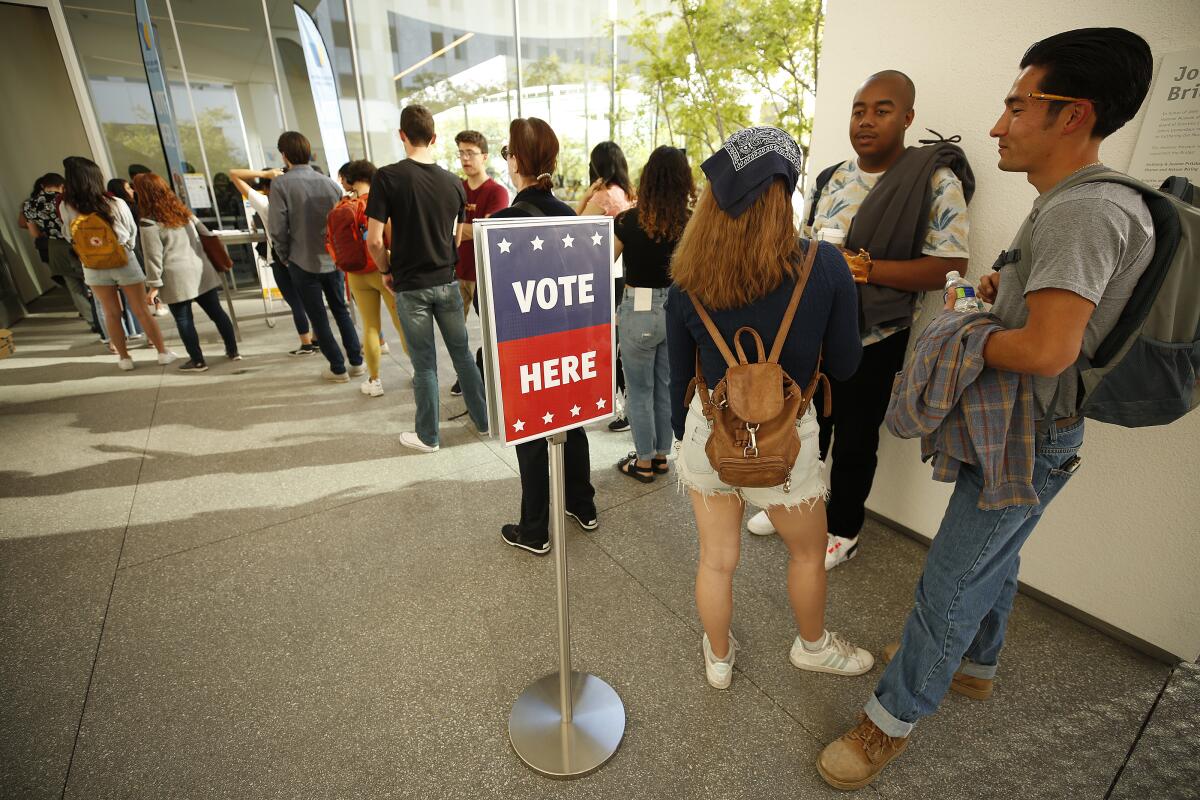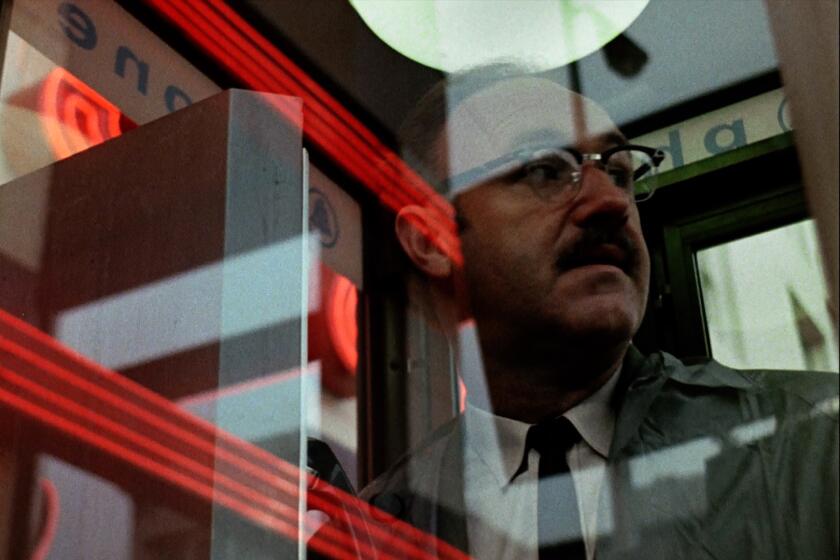Newsletter: How bad is L.A. at running elections?

- Share via
Good morning. I’m Paul Thornton, and it is Saturday, March 7, 2020. If you’re thinking about driving in much of Los Angeles tomorrow, don’t, or you’ll be caught in the quagmire of street closures and detours known as the L.A. Marathon. Let’s take a look back at the week in Opinion.
If post-election commentary focuses on the voting and not the results, you know you have a problem. In Los Angeles County — by far the nation’s most populous and arguably its most ethnically, municipally and geographically complex county — officials rolled out a brand new voting system that had been in only limited use prior to election day. Things went as many had anticipated, but not as county election officials had hoped.
The reduced number of polling locations — now known as “vote centers,” which were open days before Super Tuesday, and each of which accommodated residents from anywhere in the county — saw a crush of voters on election day, leading to hours-long lines more common in areas of the country with a history of voter suppression. At the vote center where I cast my ballot, glitchy machines, confusion over provisional ballots and some activist agitation created chaos, an experience included as part of a roundup of Times Editorial Board members’ impressions of the new system.
A cure for the common opinion
Get thought-provoking perspectives with our weekly newsletter.
You may occasionally receive promotional content from the Los Angeles Times.
The Editorial Board called this completely unacceptable:
“What L.A. County voters experienced on election day was worse than just the expected bugs and hiccups of people getting used to something new. The brand-new ballot-marking machines and check-in tablets appeared to have malfunctioned in many vote centers, causing long lines. Many voters reported that the system couldn’t find their names, forcing them to cast provisional ballots. Some people simply gave up after spending hours in line and left without voting. We will never know how many people were disenfranchised by the chaos on Tuesday.
“County Registrar-Recorder Dean Logan acknowledged that the lines were caused by a combination of high turnout and equipment problems, but he hasn’t said how many machines failed or how many of the 978 vote centers were affected Tuesday. He needs to provide details about which equipment failed and why, and then, more broadly, how it could have done so after a year of testing.
“Furthermore, how did the high turnout catch his office flat-footed? They should have been ready for an onslaught of eager voters. Elections officials have known for months, if not years, that this primary would be one of the most well-attended in state history.”
Prepare for potentially record-high turnout in November. That means taking measures to prevent lines even longer than the four-hour waits in parts of Los Angeles and the seven-hour wait at one location in Texas, write Lawrence Norden and Gowri Ramachandran. They recommend keeping printed back-ups of voter lists in case electronic databases falter, and having enough paper ballots on hand to accommodate all the potential voters who may show up. L.A. Times
More Super Tuesday post-mortems: Did California voters stiff schools out of $15 billion because the measure was labeled Proposition 13? It appears so, says the Editorial Board. Joe Biden is no Elizabeth Warren, but he may be the “aspirin America needs for its Trump headache,” writes Virginia Heffernan. The Editorial Board urges Biden and Sen. Bernie Sanders to remain civil and keep their eyes on the November prize. If you voted early in the California primary for Amy Klobuchar or Pete Buttigieg, well, sorry about that, says Jon Healey. Columnist Jonah Goldberg similarly expresses reservations about early voting in California.
Elizabeth Warren did not fail. Before coming up short on Super Tuesday and exiting the race, she single-handedly took a buzz saw to billionaire Michael Bloomberg’s theretofore high-flying yet untested campaign. She put out detailed plans for everything she wanted to accomplish, a campaign tactic that should have endeared her more to progressive voters. But in the end, she was felled by the nutty notion of “electability,” writes Robin Abcarian. L.A. Times
Enjoying this newsletter? Consider subscribing to the Los Angeles Times
Your support helps us deliver the news that matters most. Become a subscriber.
Universal healthcare would make fighting the coronavirus a lot less hopeless. The best way to prevent a pandemic is to ensure that all people have access to care, note Sara R. Collins and David Blumenthal. If staying home is the best advice for sick people, writes Mariel Garza, then why aren’t we paying these people not to show up to work? The Federal Reserve can’t cure COVID-19 with a rate cut, but it can spread panic in the economy, says Jon Healey. Health officials have warned of the coronavirus’ effect on vulnerable patients, and a reader points out that Los Angeles has thousands of the most vulnerable individuals imaginable: homeless people.
We have a new coronavirus newsletter. Subscribers to the L.A. Times’ health and science newsletter are already receiving it; if you are not one of them but would like updates on the coronavirus, I highly recommend signing up, which you can do here.
Stay in touch.
If you’ve made it this far, you’re the kind of reader who’d benefit from subscribing to our other newsletters and to the Times.
As always, you can share your feedback by emailing me at [email protected].
A cure for the common opinion
Get thought-provoking perspectives with our weekly newsletter.
You may occasionally receive promotional content from the Los Angeles Times.




